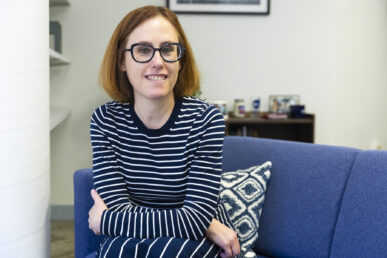Distinguished Researcher Award, Social Sciences: Claire Decoteau, College of Liberal Arts and Sciences
Public health crises tend to expose existing structural inequities. For example, during the COVID-19 pandemic, Black and Latino Americans were more likely to get sick and die from the illness than other racial groups. That exposed structural failures in health care, housing and economic policies.
Claire Decoteau’s research focuses on understanding health inequities from the perspective of those who suffer the worst effects and have the least influence to change policies. She has conducted in-depth studies of communities experiencing health crises, from the HIV epidemic in South Africa to autism cases among Somali immigrants in the U.S. and Canada to Chicago during the COVID-19 pandemic.
“Crises tend to expose the workings of structures that create inequalities in ways that capture something different than if you just study them in everyday situations,” said Decoteau, professor of sociology at UIC. She generally conducts in-depth ethnographies; she immerses herself in a community and builds relationships and trust to understand people’s struggles and the systems that cause them.
Her first big project was in South Africa, where she spent two and a half years in squatter camps outside Johannesburg with people who were HIV-positive. She wanted to understand how struggles for affordable HIV medications were linked to struggles for access to water, electricity and land access. She also analyzed how the South African government’s economic policies impeded their progress on providing HIV medication to their people.
One of the lessons from Decoteau’s research is that even policies designed to mitigate inequalities can exacerbate them, especially for vulnerable groups. For example, South African public health workers were so focused on getting antiretrovirals to HIV patients that they were dismissive about possible contributions from indigenous healers.
“There would have been very simple ways to incorporate indigenous healers into the HIV response instead of ignoring them and their power and importance to people,” she said.
Likewise, in Chicago during the pandemic, the city spent money to track epidemiological data that revealed inequities in cases and care. Yet Decoteau’s work showed a better alternative would have been for funds “to be used for direct services to the poor,” such as cash assistance for housing and food, she said.
She credits UIC for embracing the mission of doing research in communities to help those most in need. And she feels particularly accomplished when she can help the communities she studies advocate for themselves, such as when she helped South Africans research local living conditions through surveys, giving them data to ask for more resources from local officials.
“I’m very proud to be able to do theoretical work that is also about inequality in people’s everyday lives,” she said. “It’s important to be able to translate that back to the people you’re reporting on.”
Read about other Researchers of the Year and Inventors of the Year this week on UIC today, with new profiles posted each day. On April 22, find coverage on UIC today from the Researcher of the Year awards ceremony.

